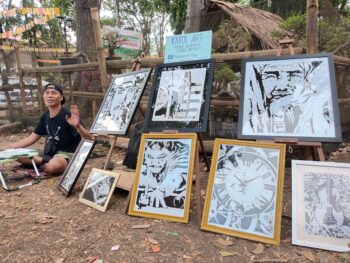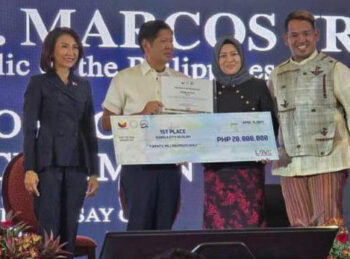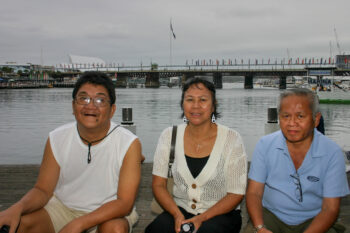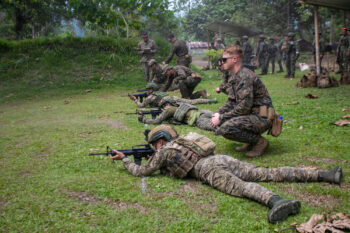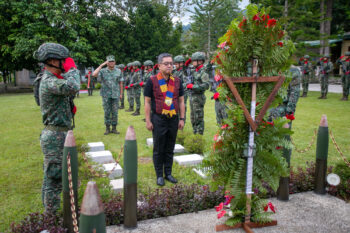CAGAYAN DE ORO CITY (MindaNews/08 August) — Citizen volunteers used to perform many of the important chores in the community—as firemen, postal deliverymen, traffic officers, etc. They delivered mail, directed traffic, fought fires, pruned trees, maintained parks, cleared sidewalks, and so on.
Motivated by nothing more than a desire to help beautify, secure, or promote the common good, citizens volunteered to do many of the tasks required in their community.
Not only was it neighborly to do so, it was a normal part of being a dutiful citizen. To be civic-spirited meant caring for the environment that sustains man and nature, plus it was a way to contribute to nation-building.
For them, keeping the environment healthy and orderly was its own reward. They had pride of place, joy in community service, satisfaction in neighborliness—all of which produced a sense of security, a dividend earned from living in a caring community.
*****
Unfortunately, those days seem long gone. Neighborliness or civic spirit is rarely manifested even in our small villages.
There’s no sense-of-community, the sense that drives people to pitch in and help in communal chores—the kind one sees in Small Town America where citizens volunteer as fireman, traffic officer, postman, even street sweeper—especially when the local budget is too small to cover operations. To this day, volunteers there manage community sports programs; for instance, the fabled Little League in baseball is a huge volunteer undertaking even in large U.S. cities.
Others operate day care centers, conduct fitness sessions for seniors, handle adult education classes, or organize arts and crafts clubs in neighborhoods, and so on. It’s all the more edifying that many of the volunteers are doctors, lawyers, executives, and such. Seeing them serve their community pro bono is an edifying sight to behold.
*****
It was like that in the Philippines before. Back then, barrio officials held purely honorary positions, serving without compensation or allowance.
Yet they had far less authority, resources, or privileges than do the barangay officials of today. But they carried out the same sort of programs and projects as today’s, often more and with greater enthusiasm. They were well motivated citizens.
Whatever they did or volunteered for, they did out of a sense of responsibility for their community, an exemplary commitment of service to help fellow citizens.
What was inspiring about that arrangement was how individual commitment blended to produce communal wellbeing. From such edifying cooperation, the community learned to appreciate civic-mindedness and be grateful for it.
*****
Civic-minded citizens see life in the community as a privilege, a gift of citizenship, one that yields rich dividends from warmth in neighborly relations.
The resulting sense of solidarity inspires neighbors to uphold and enhance life in the community—to appreciate it more deeply, to take care of it, to love it.
When you love a place, you love doing good things in it, to be neighborly. It fosters a sense of belonging. You live in it, you belong to it, so it’s yours to put in order, to safeguard, to beautify, to turn into an environment conducive to all sorts of human pursuits.
But this sense seems to have flown out of sight. An attitudinal change has occurred, a shift in our value system. Hardly anything is volunteered anymore.
*****
You want your neighborhood secure? Hire barangay tanod or security guards and off-duty policemen! Your child lags in class? Hire a tutor or a moonlighting teacher! You need fitness facilities? Go to a commercial gym!
Because there are no worthy facilities or programs in our barangays, the people in them do not develop an attachment to it, a pride of place.
Only in a very few places (Marikina City, is one) are there reading centers or public libraries in the barangay, no communal parks or gardens for civilized leisure habits, no public facility for hobbies or for learning new ones.
You have to go to a commercial bookstore for your reading needs, buy a newspaper from commercial stands, or cultivate your own lawn and garden if you’re fortunate enough to have a yard.
*****
Before, we even had communal grounds or clearings for animals. About the only communal grazing or pasture area in operation today is the one in Impasugong, Bukidnon, in Northern Mindanao. It was the ranch setting of the box-office sensation starring Piolo Pascual and Angel Locsin entitled “Love me Again.”
In our inner cities before there were purok reading centers, with free materials where volunteer housewives or civic-minded youth read stories for young children during their free time. Not anymore!
In not encouraging volunteerism, the officials (and their supporters) deny their neighbors a chance to serve. A disservice to the public service!
Manny is former UNESCO regional director for Asia-Pacific; secretary-general, Southeast Asia Publishers Association; director, development academy of Philippines; member, Philippine Mission to the UN; vice chair, Local Government Academy; member, Cory Govt’s Peace Panel; awardee, PPI-UNICEF outstanding columnist. He is president/national convenor, Gising Barangay Movement Inc. valdehuesa@gmail.com


